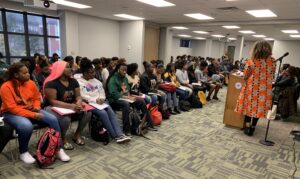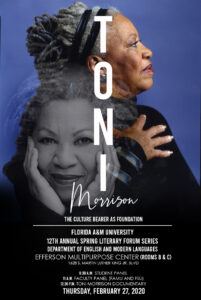
During the 12thAnnual Spring Literary Forum Series, the Morrison Scholars panel consisted of four faculty members from either Florida A&M or Florida State University that shared more than just the table and microphone. They shared a bond through education, literature and specifically, their gratitude for Toni Morrison and her work.
All four panelists have either been acquaintances, taught or mentored by one another during their undergraduate and/or graduate tenure. Panelist Natalie King-Pedroso is an Assistant Professor of English at FAMU. She presented the idea of looking at Morrison’s work as entertainment instead of just “work.”
“When people are writing they are thinking about an audience and that is you. More than anything their goal is to touch something human in you and that is what you need to remember. They are not necessarily writing for university classes; they are writing because they want you to be entertained and that is how you should try to see it,” said King-Pedroso.
King-Pedroso makes it her job to remind students in the audience that yes, panelists are the “teachers,” but students are still allowed and capable of teaching them through their own narratives as well.
Another panelist, Maxine Montgomery is an English professor at FSU who likes to introduce her students to Morrison’s work when possible.
“When you pick up any text by Morrison you have to be willing to abandon your own objective and academic scholarly perspective and immerse yourself into the world that she’s creating as the master story-teller,” Montgomery said.
Montgomery revealed that understanding this strategy is the first key taught in her classes before diving into Morrison’s work. This is because it makes comprehending Morrison’s complex ideologies less intimidating and more welcoming, she explained.
Drastic head-nods and wide smirks amongst the other panelists and audience members ensured that this was true.
Panelist, Kendra Mitchell is an assistant professor of English at FAMU. She shared her experience with getting herself and her students on the right path by focusing on the things they do know instead of what they do not.
“What I can say is, don’t tell me what you don’t know because there’s a lot I still don’t know, but where can we start? We can start with a slither and then we can anchor it on something else you know so we provide another context,” said Mitchell. “If I was desperate, I used anything I could find like reality TV, music, any kind of ads or whatever is circulating because I believe that is still the true Morrison approach since she draws from cultural knowledge.”

An example of cultural knowledge could be associating dreams of fish with being pregnant (discussed at the event) or cartoons such as Animaniacs or Jaybo. Certain dishes can also be included in this conversation like chitlins which is known for its historical context that arose during slavery.
Mitchell explains it’s okay if someone doesn’t know the specific knowledge discussed in literature yet because you’re in the process of learning what you do have and how it can be applied to help in other areas.
Yolanda Franklin also served as a panelist and is currently a Visiting Professor at FAMU.
“We cannot imagine a world without Morrison’s voice and that is part of the example and legacy that she left behind. That your voice matters, that your voice is important and that’s why you have to do the work,” said Franklin.
Franklin mentioned that she doesn’t live for the summary, but for the conversation because that is when students truly learn and understand literary work.
Avia Wideman is a psychology student at FAMU who attended the event to support one of her professors.
“The chemistry that the panelists shared when discussing Toni Morrison was undeniable and it inspired me to want to read Morrison’s work through a different lens,” said Wideman.
Morrison was known for winning the Pulitzer and Nobel Prize for her literary work. She was also awarded the U.S. Presidential Medal of Freedom. Morrison lived from 1931-2019.